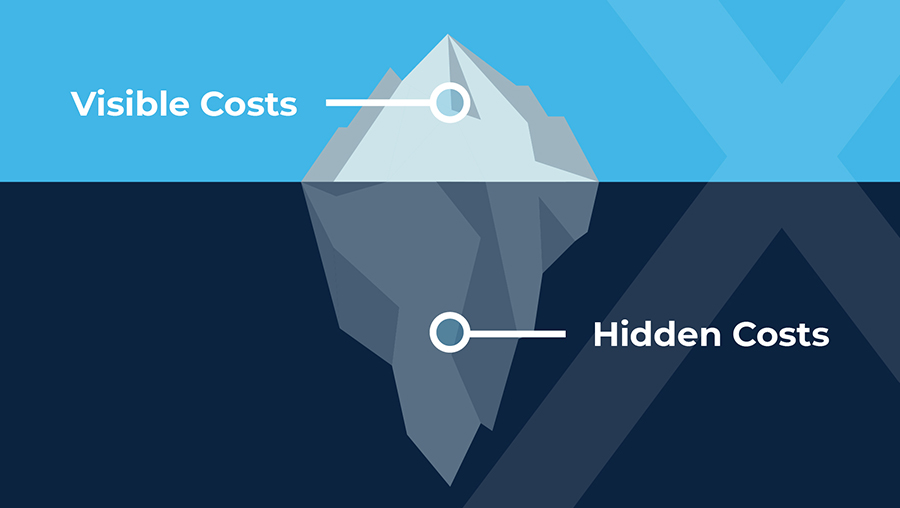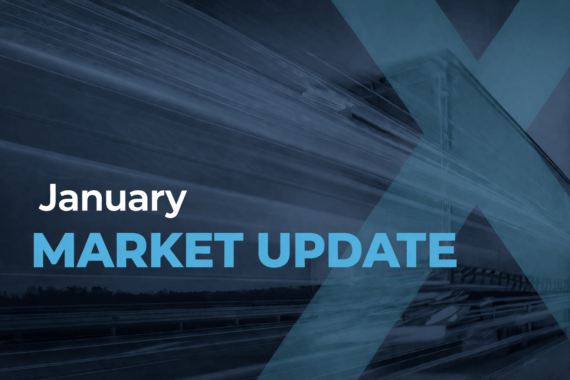
By accurately estimating logistics costs with the right partner, food suppliers can improve operations
Managing logistics costs for food shippers is similar to the iceberg illusion. The visible, more obvious shipping expenses – like securing the best linehaul rate – represent just a fraction of the total transportation costs. Beneath the surface lie numerous hidden costs that make it challenging for food suppliers to manage their transportation spend.
Several factors contribute to these hidden costs, including:
- Fluctuating demand and capacity
- Seasonality
- Length of haul
- Accessorial requirements
- Weather conditions
While some of these factors, like weather, are beyond your control, there are strategic approaches food suppliers can take to minimize costs and ensure on-time, in-full deliveries for retailers. As the American Public University points out “…budget control for domestic and global supply chains doesn’t merely revolve around cost-cutting. It involves optimizing operations to deliver maximum value with minimum waste, thereby impacting the total cost of the products or services.”
Choosing Between Contract Rates and Spot Rates
A crucial step to better forecasting logistics costs is deciding between the two most common pricing options: contract rates and spot rates.
Contract rates are ideal for food suppliers with regular shipments along consistent lanes, especially during peak seasons. This option locks in pricing and capacity for a set period, typically three months, ensuring stability and predictability in your transportation budget.
Spot rates are best for one-time shipments or when dealing with fluctuating market conditions. This option is suitable for companies with irregular shipment volumes or lanes, allowing flexibility to respond to immediate supply chain disruptions by adjusting to current market rates.
If you’re uncertain about which option is best for your product, bringing in a dedicated logistics team to handle contract negotiations or unearth the best spot rates often provides clarity and expertise for your team.
Understanding the Risks of Low-Cost Carriers
While it might be tempting to focus on cutting costs by choosing low-cost carriers, this approach often leads to more significant, and oftentimes costly, issues, including:
- Poor service quality
- Delivery delays and OTIF fines
- Missing or damaged goods
- Unexpected charges
- Incomplete documentation
- Minimal or missing insurance coverage
Choosing the lowest freight rate can result in extra fees which can lead to higher long-term costs. It’s important to consider carrier reliability, all-in rates, and soft costs before awarding a low-cost carrier a load. Bringing a logistics partner on board to vet carriers that are cost-competitive, dependable, and meet your retailer’s delivery needs can save your team the hassle and headache of finding and vetting new carriers, so they can focus on their core responsibilities.
Accounting for Accessorial Fees
Accessorial fees are another hidden cost that can significantly impact your budget. According to FreightWaves, accessorial fees make up 40% of total freight spend. Unfortunately, these fees are a regular occurrence in the food retail industry and are difficult to mitigate.
Common fees for food shippers include:
- Driver Detention
- Reconsignment
- Truck order not used (TONU)
- After-hours delivery
- Layovers
- Stop Offs
- Out of Route Miles
- Reefer Fuel Surcharges
Logistic tools, like a transportation management system (TMS), help suppliers better understand and forecast their all-in transportation costs, inclusive of accessorials. A TMS also simplifies the calculation of your total freight spend by pulling your invoice and purchase order data into one comprehensive dashboard.
Leveraging Technology
A comprehensive BI dashboard provides real-time insights into logistics costs, helping suppliers manage and reduce expenses. It converts multiple data sources into a centralized platform, offering visibility into:
- Number of orders
- Number of shipments
- Shipments by location or warehouse
- On-time pick up and delivery percentages
- Cost per mile
- Cost per pound
- Total freight spend
By leveraging supply chain analytics tools, food shippers can make data-driven decisions, streamline operations, and ultimately achieve greater cost efficiency and reliability in their supply chain. This technology also ensures that your logistics strategy remains agile and competitive in an evolving market.
How DLX Became the Food & Meat Shipping Experts
Food shipping insights don’t have to stop here! If you’ve enjoyed this article, head over to our Meat Shipping Experts page to learn more about how we’ve helped some of the nation’s leading food companies streamline their operations and save on shipping.
Full-Service Logistics Partner
Dynamic Logistix’s full-service XTMS platform equips food suppliers with the tools needed to navigate their logistics data and improve cost management. Our network of over 10,000 carriers guarantees reliable and efficient transportation solutions for your supply chain.
By partnering with Dynamic Logistix, food shippers gain the tools to better understand and address hidden costs, select the right pricing strategy, and leverage our XTMS platform to manage logistics costs more effectively and maintain a competitive edge in the food retail market. Calculate your annual savings with XTMS on our website or book a demo with one of our experts.



